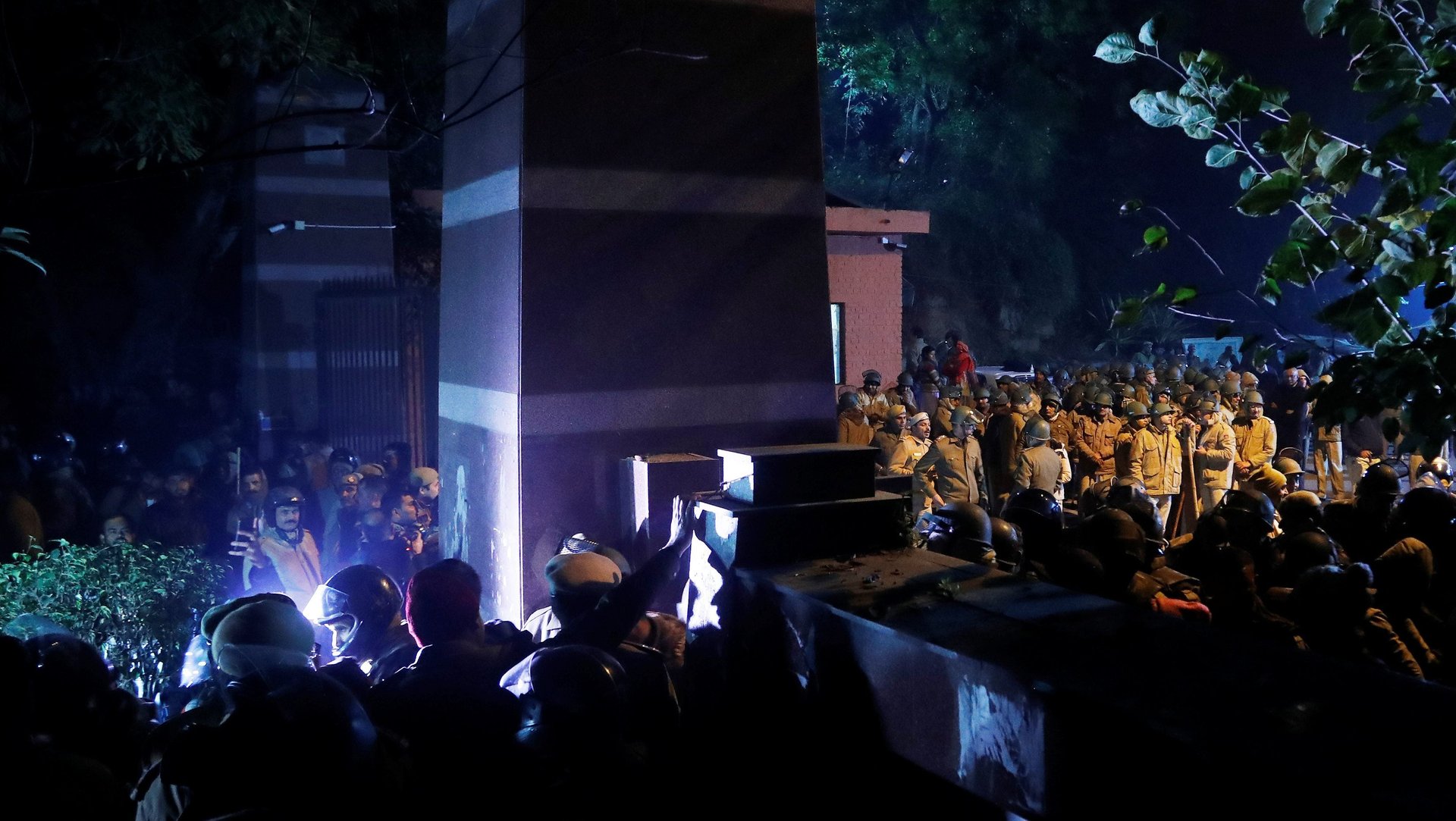“Shoot the traitors”: Bone-chilling scenes as mob ravages top Indian university under cops’ nose
One of India’s most reputed universities plunged into violence and chaos late last night (Jan. 5).


One of India’s most reputed universities plunged into violence and chaos late last night (Jan. 5).
Violence broke out inside New Delhi’s Jawaharlal Nehru University (JNU) after a mob of masked men and women, armed with sticks and rods, attacked students and teachers. The administration subsequently called in the police, which later in the evening conducted a flag march.
At least 23 were injured, including JNU Students’ Union (JNUSU) president Aishe Ghosh and faculty member Sucharita Sen. The victims have been admitted to the All India Institute of Medical Sciences and Safdarjung Hospital.
JNUSU has blamed the Akhil Bharatiya Vidyarthi Parishad (ABVP), the student wing of the Rashtriya Swayamsevak Sangh (RSS), for the violence. The RSS is the umbrella organisation to which India’s ruling Bharatiya Janata Party (BJP) belongs.
However, ABVP has denied the allegations.
While the reason for the violence remained unclear, the JNU administration, in a press statement yesterday, claimed the violence began when a group of students “opposing the registration process entered the premises and damaged property.” The statement also mentioned “masked miscreants,” but did not say much about their possible identity. Interestingly, the JNU administration retracted an earlier, simpler statement on the issue to come out with this more detailed one.
Under the cover of dark
The whole turn of events remained murky hours after it took place. Particularly since the police were allegedly in cahoots with the rampaging mob. Videos posted on Twitter and Facebook showed them either doing nothing while the violence was going on or escorting the alleged goons out of the campus.
They reportedly discouraged people from video-recording the developments.
JNU has been at loggerheads with the ruling dispensation since at least 2016, and this is the third time that things have come to a showdown. Only a few weeks ago, the students had launched a massive protest against the government for raising tuition and hostel fees abruptly.
A leftist bastion for decades, JNU is perceived as a fountainhead of anti-establishment sentiments, particularly against the Hindu nationalist regime of prime minister Narendra Modi.
Even amidst yesterday’s chaos, crude slogans like “Goli maaro saalon ko…” (shoot them) were raised openly against the students and teachers of JNU by the mob which called them “deshdrohi” (anti-national). “Anti-national” has been a staple slur used by Hindu nationalists against JNU for some time now.
After the injured were shifted to AIIMS, a mob gathered around the trauma centre there, raising slogans.
Media persons covering the incidents also came under attack.
Journalist Rohan Venkat of Scroll.in, too, was subjected to violence.
Other reporters had similar experiences.
Within a short while after the violence at JNU, social media was abuzz with screenshots of WhatsApp chats where purported rightwing groups were seen calling out to each other to strike the JNU students and teachers. These messages were passed around as evidence that the whole episode was well-planned.
The chaos that followed
Hours after the attack, the political leaders and media persons who visited the campus to take the stock of the situation were also shoved around, beaten, and manhandled by alleged right-wing goons.
National president of Swaraj India party, Yogendra Yadav, was among those heckled. The politician fell down amid the chaos outside the JNU main gate.
Meanwhile, the Delhi police, which only a few days ago went on a rampage inside the Jamia Millia Islamia campus with live ammunition, remained a mute spectator to the violence this time.
The Delhi police action inside Jamia came after students protested against a new citizenship law that allegedly discriminates against India’s Muslims. The violence inside Jamia has sparked a nationwide furore with protesters taking out marches in city after city.
In solidarity with JNU
Various political leaders, including Delhi chief minister Arvind Kejriwal, took to social media to condemn the violence. Foreign Minister S Jaishankar and finance minister Nirmala Sitharaman, both JNU alumni, tweeted their strong disapproval.
Priyanka Gandhi, scion of the Indian National Congress, visited the injured at AIIMS.
Within hours, students and members of the general public were organising protests across the country against the JNU violence.
Hundreds gathered at the Gateway of India in Mumbai last night, raising slogans and demanding stringent action against the assailants.
Students at the Aligarh Muslim University in Uttar Pradesh took out a candlelight march in solidarity. Those in Hyderabad also held a demonstration, while students of the Film and Television Institute of India in Pune and Jadavpur University in Kolkata joined the agitations late at night.